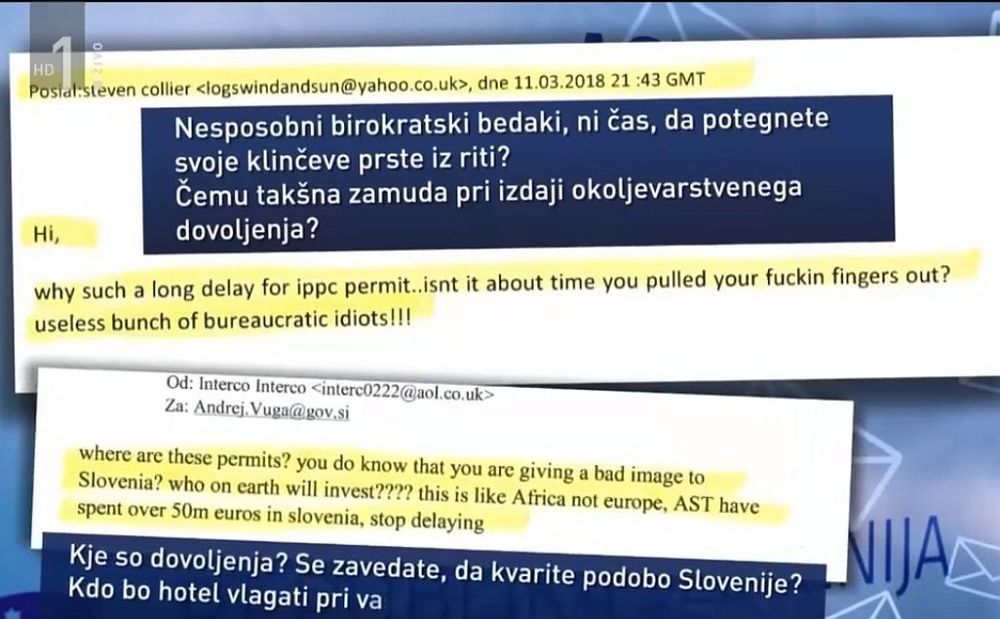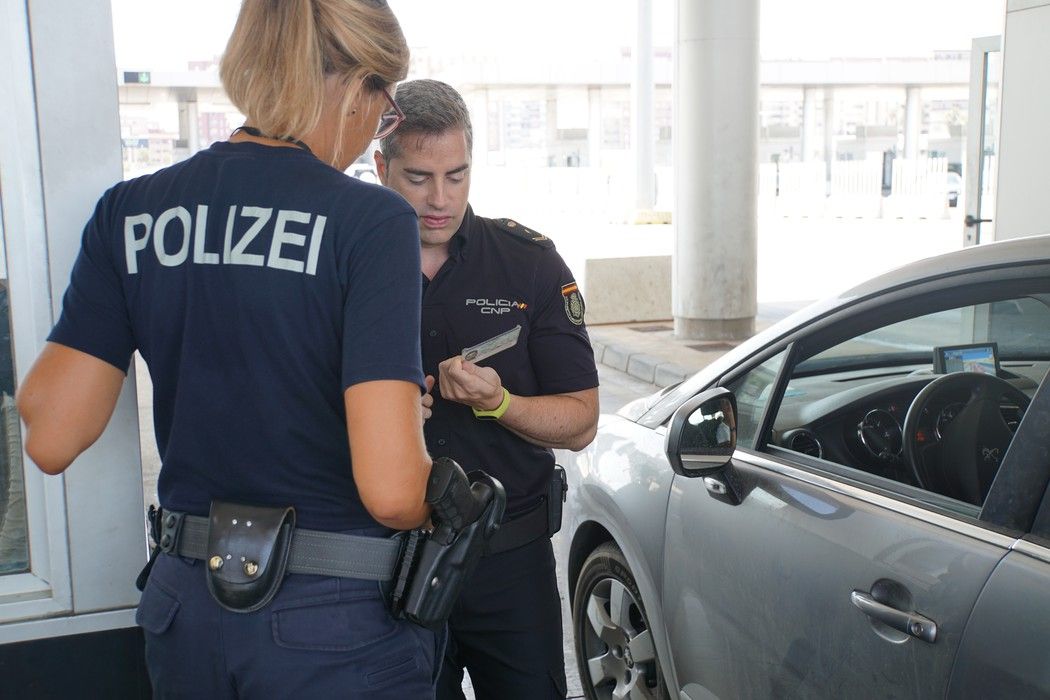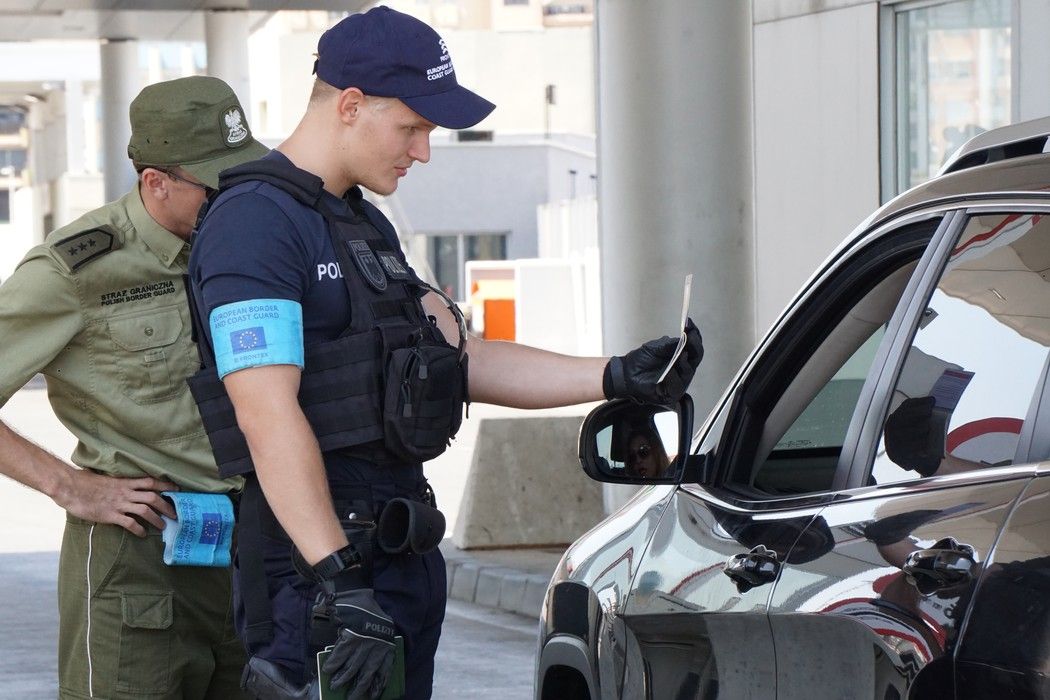News
December 8, 2018
The drama over Petišovci gas extraction permits and the British company Ascent Resources appears to be one of those classic tales of a conflict between one country’s sovereign right over its environmental protection standards and the profit-making interests of the international capital, backed by neoclassical economics’ arguments on the beneficial effects of any foreign direct investment on the local economies.
However, this textbook ideological conflict was given another spin by an army of internet trolls, who sent a series of harassing messages to Slovenian government officials, including the Minister of Environment, which resulted in strengthening the Minister’s police protection and an internal investigation into the procedures surrounding the issue of environmental permits by the Ministry’s environmental agency (ARSO). With the British Ambassador also involved in lobbying for the British firm, three Slovenian political parties have also demanded that her involvement be investigated.
The issue centres on fracking in Slovenia
Gas has been extracted at Petišovci, North East Slovenia, since the 1960s, first by state-owned enterprises, then in 2002 the concession was granted to Geoenergo d.o.o. whose equal shareholders are two state-owned firms, Petrol and Nafta Lendava. Initially, gas was being extracted under its own pressure, until, according to Gorazd Marinček, eco activist, the problematic method of hydraulic fracturing, or “fracking”, was introduced in two wells around the year 2011.
At least since 2011, Geoenergo has been in a 25/75 Joint Venture Agreement with the Maltese firm Ascent Slovenia Limited, a subsidiary of a London based company Ascent Resources (established in 2004). Another subsidiary of Ascent Resources, Ascent Resources d.o.o. is also located at the same address in Lendava. According to a recent edition of RTV Slovenia’s Tarča (Target) the only income of the Ascent Resources comes from unrefined gas extraction from the two remaining operating wells in Petišovci. The chain of companies, according to Tarča, reported a loss of over EUR 2.5 million last year, while awaiting the ARSO environmental permit that would allow it to deepen the wells and boost production, as well as to “build a processing plant to treat the gas for injection into the Slovenian national gas network achieving the highest possible price” (source).
The joint venture applied for and also received the environmental permits in 2014. However, environmental NGO’s appealed to the Ministry of Environment, although their appeal was rejected, so they moved further to the administrative court, which confirmed procedural inconsistencies in the permit issuing process and returned the matter back to the starting point at ARSO. The process was repeated again with an appealed to the Ministry, then the administrative court, which rejected the appeal, so that the process in this second round has not yet been cancelled.
Pressure from British investors, and irregularities in the permit process
Meanwhile, the British side of the venture has been growing increasingly impatient. On February 15 2018, the CEO of the Ascent Resources, Colin Hutchinson, visited then Slovenian Prime Minister Miro Cerar, and on July 4th representatives of the company met with the Economic Minster. However, in August, when the old government was leaving and new one hadn’t taken over yet, a meeting was arranged at the initiative of the British-Slovenian Chamber of Commerce. The invitations to all parties were dispatched by the Ministry's directorate, and, most problematically, the meeting was eventually attended by Nataša Petrovič, the director of the Environment and Nature Protection Office in charge of ARSO’s environmental permits.
Apparently, at this meeting, which, according to the Ministry was only of informative nature, promises were made to the Ascent Resources (AR) that the environmental permit would be ready before the end of September, which is what AR then announced to investors. At the end of October, however, the new Environmental Minister, Jure Leben, introduced an internal investigation into the possibility of any external pressures being exercised over the ministry’s officials in the process of issuing environmental permits. The investigation eventually confirmed irregularities in these procedures, which included the August meeting of Nataša Petrovič with the AR representatives. As Tarča reported: “the Office director has participated in the meeting and provided information on specific procedures, thereby raising doubts as to the autonomy and independence of the Office, and allowing public interpretations, harmful for the reputation of the Office and its officials.” Furthermore, no minutes of this August meeting exist nor has the lobbying contact been reported to the Corruption Prevention Commission.
Threats of legal action accompanied by hate mail
Also at the end of October, AR announced it would explore taking Slovenia to the EU Court after the company failed in its attempts to get a response from the Environment Agency on Jure Leben’s internal inquiry into the awarding of environmental permits.
Furthermore, the number of offensive messages sent to ARSO, presumably by enraged British shareholders, multiplied and also hit Minister Leben’s mailbox and Twitter account. The minister is currently under enhanced police protection while a criminal investigation into the source of messages is taking place.



Insulting comments by what appear to be fake Facebook accounts even managed to find their way to our own website, trying to stir the fight under an article on the matter. Luckily, nobody took the bait.

Let’s not forget that in America in 2016 “Russian actors organized both anti-Islam and pro-Islam protests in the same location at the same time on May 21, 2016, using separate Facebook pages operated from a so-called troll farm in St. Petersburg”. The whole mission costed about US $200. (Source)
The British Embassy connection
To complicate the situation a bit further, on November 13 the British Ambassador to Slovenia, Sophie Honey, paid a visit to the Environmental Minister Jure Leben, asking questions about the possible deadlines for environmental permits and also about the results of the internal investigation. HMA Honey appears to have been advocating for the Petišovci project at least since January 2017, when she visited the site of the project and met with the Slovenian and British partners.
At about the same time three extra-parliamentary parties, Solidarity, Pirates and the United Left, asked for an ethical assessment of the British Ambassador’s conduct, who they believed lobbied the previous government to accelerate the license award process.
As reported by Delo, the British Embassy in Ljubljana denied the allegations, and explained that HMA Sophie Honey did not in any way want to influence the Slovenian decision, but only highlighted the need for predictable deadlines in procedures for foreign investors, including for AR, with this being an important part of achieving the goals of increasing bilateral trade and investment between the states.
Furthermore the tree political parties stated that they saw AR’s attempt to take Slovenia to the EU Court, to overrule the Slovenian system, as a kind of threat, even if no other pressures were being applied.
Let’s not forget that the confidence of Slovenia’s environmental administration in dealing with pressures from foreign capital rose significantly just last month, when the French multinational Lafarge sued Slovenia over being denied a renewed environmental permit after years of burning banned petroleum coke in its cement plant in Trbovlje. Lafarge finally lost its case at the Slovenian Administrative court, and is currently shutting down its operations in Slovenia.
Mladina: Slovenia experiencing serious crisis of managerial class
STA, 7 December 2018 - Speaking of ignorant arrogance that occasionally slides into direct hostility towards the working class, the left-leaning weekly paper Mladina casts in its latest editorial the new Chamber of Commerce and Industry (GZS) director Sonja Šmuc as the embodiment of a serious crisis of management in Slovenia.
While social dialogue in Slovenia used to be at a level comparable to that in Scandinavian countries and featured refined managers with a good overall grasp of the economy and society, Šmuc is now demonstrating serious empathy issues, talking about workers with an air reminiscent of the arrogance of French queens just before the revolution.
Rejecting dialogue on a serious adjustment of wages, threatening with cancelling collective bargaining agreements in what is the fifth consecutive year with one of the highest GDP growth rates in Europe, amid record-low unemployment and record-high profits ... could be described as sad, but it is actually worrying.
Šmuc is an expression of a deep crisis of corporate governance in Slovenia, which has been dragging on for years, Mladina editor-in-chief Grega Repovž asserts.
He argues that today's managers were raised during the crisis or are even a product of the crisis itself. Having gone through a series of turbulences, including political pressure and purges, the Slovenian economy did not see the knowledge and experience of the managers of the old generation being transferred to the new one.
There are practically no managers left today capable of serious macroeconomic insights. The language of today's managerial elite is simple, elementary, bereft of progressive elements, of serious reflection.
While arguing that this is also being reflected in companies, for instance in low productivity, Repovž says that a professional group that has so much influence on development should stop ignoring the crisis in its ranks.
The discontent over wages, which is real and justified and largely a result of neoliberal capitalism, will end up exploding with full force. It suffices to look at France, which is experiencing the same frustrations.
The difference is that while France has still not emerged from the post-crisis crunch, Slovenia is among the fastest growing European economies. Arrogance is not a sign of power, it is a sign of weakness, Repovž concludes the commentary entitled “Managerial Crisis.”
Demokracija: Deep state ignores certain issues
STA, 6 December 2018 - The deep state is re-directing the people's attention to artificially created problems, such as hate speech, while certain topics in need of attention get largely ignored, the right-leaning weekly Demokracija says on Thursday under the headline “Masters of Ultimate Illusion of Virtual Reality”.
With the help of mainstream media, the deep state of the transitional left is constantly redirecting the citizens' attention from real problems, most recently by trying to convince us there is nothing more important in Slovenia than hate speech.
But in the meantime a number of things are going on which should get at least as much attention, editor-in-chief Jože Biščak says, listing the bad bank, the Karavanke tunnel and minimum wage debate.
He says nobody is paying any attention to the Bank Assets Management Company, or the bad bank, whose mission is, or was, to return to taxpayers as much money spent to save Slovenian banks as possible and then close down.
But it is still here. And after its Swedish leadership was replaced, it has turned into a socialist asset management company whose priority is to cater to the needs of "our people".
Its brisk action to sell liabilities has been replaced by a gradualist approach and its life span prolonged into the next decade. This is enough for companies to get slowly grabbed by tycoons, with the money getting into the "right" pockets.
Another example is developments surrounding the construction of a second tube of the Karavanke tunnel, the tender for which was won by Turkey's Cengiz Insaat as the most experienced and cheapest bidder, but since three Slovenian builders complained, the national review commission annulled the tender.
Biščak notes the Turks would build the tube for EUR 89.3m whereas the second cheapest bidder would do it for over EUR 100m, but since the latter is "ours", nobody doubts its "fair" price.
The debate on the minimum wage has also passed without causing any major stir, even if economists and employers warned about its pitfalls, with the mainstream media even applauding the planned changes to the minimum wage law.
Biščak says "the fact that the law is in breach of the Constitution, violating the free economic initiative, is apparently not important ... But as you know, 'our guys' always know better and can do anything".
Other posts in this series can be found here (note that sometimes we use another right-wing weekly, Reporter)
STA, 7 December 2018 - The prosecution has withdrawn charges of negligence against a former Ljubljana primary school headteacher who banned two male final year students from school grounds after they allegedly sexually harassed a pair of their female classmates.
In a press release, the Ljubljana Supreme Prosecution Office said on Friday that the district prosecution took the decision after examining the defendant's written and oral arguments and documents in the file.
"In his plea, Dušan Merc shed light on the matter by presenting relevant circumstances material for the assessment of his conduct," the release said.
The prosecution concluded that Merc cannot be accused that he caused grave violation of human rights of the two students because their constitutional right to education was not violated.
According to media reports, Merc, the former headteacher of the Prule primary, was put on trial on charges of negligence at work for allegedly violating the two boys' right to education.
The case goes back five and a half years when two year 9 Prule students harassed their classmates in a swimming pool during a sports day.
After pushing them under water several times to the point of exhaustion, they sexually attacked the girls and later even made fun of them on school premises.
Five days later, after the marking period was over, Merc banned the boys from school grounds in order to protect the victims, but a schools inspector found him in the wrong and the case was later taken up by the prosecution.
STA, 7 December 2018 - The Maribor Prosecution Office has filed an indictment against Andrej Šiško, the leader of a para-military unit that call themselves the Štajerska Guard, who has been in custody since early September.
Darko Simonič, the head of the prosecution office, said the indictment, alleging instigation to the subversion of the constitutional order, was filed with the Maribor District Court on Thursday.
The prosecution also proposed for Šiško to be remanded in custody. The last monthly extension of his detention would expire on 12 December.
Once an indictment is filed, the court's pre-trial panel of judges may extend detention for up to two years.
"Considering that the court has always supported us on custody, except for the first investigating judge, there's probably no dilemma about custody. Nothing that would warrant a different conduct has happened in the meantime," Simonič said.
An armed militia was filmed in September
Šiško was apprehended on 6 September, three days after a video emerged of him lining up several dozen men, some armed, wearing balaclavas and conducting what appeared to be basic military training.
After extending his 48-hour detention twice, the investigating judge released him, but he was brought back into custody on 12 September after a court panel reverted the judge's decision.
The Supreme Court rejected his appeal against detention, upholding the lower courts' reasoning that there were reasonable grounds to believe the suspect formed a para-military unit and called for the formation of other militias across Slovenia that would, when the time was right, bring down the highest authorities of the state.
Šiško and his counsel Viktor Osim argued that Šiško's conduct did not amount to instigation to the subversion of constitutional order.
A colourful past, including jail time for attempted murder
Šiško, a former ultras leader who has served prison for attempted murder, argued the line-up was a provocation meant to disclose how Slovenian media work. However, he had called for the establishment of other such militias around the country.
The Supreme Court noted his past conduct, from the utterance of a threat against then Prime Minister Miro Cerar in January 2017 to the formation of the para-military unit.
Osim said today he was not surprised by the timing of the indictment, arguing that it would help the prosecution to avoid the decision on custody being taken by the Supreme Court.
He plans to appeal against the indictment at any case, although he had not yet been formally notified of it being filed.
Information available to him indicates that the indictment also concerns co-defendant Matej Lesjak, a former member of the youth wing of the Democratic Party (SDS) who allegedly filmed the paramilitary formation's training, but his lawyer Mihael Jenčič could not confirm the information for the STA because he had not yet received the indictment.
Osim had proposed taking witness statements from PM Marjan Šarec, his predecessor in office Miro Cerar and President Borut Pahor so they will be able to tell whether they felt threatened by Šiško.
Osim also proposes hearing Janez Janša, the leader of the opposition Democratic Party (SDS), who he said publicly proposed forming a national guard or a para-military formation back in 2015.
Šiško is the head of the non-parliamentary party United Slovenia. He stood in the 2017 presidential election, winning 2.21% of the vote. He also ran for Maribor mayor from detention last month, securing 1.43% of the vote.
All our stories on Andrej Šiško can be found here
STA, 7 December 2018 - Norwegian biathlete Johannes Thingnes Boe won on Friday the second individual men's race, a 10-km sprint, hosted by Slovenia's Pokjuka as part of the opening meet of the Biathlon World Cup season.
Boe, who missed one shot, was followed in second place by Antonin Guigonnat of France (+16.1 seconds), while third place went to Russia's Alexandr Loginov (+16.5).
Slovenia's biathletes did not have a good day, with Jakov Fak, who finished fourth in Thursday's opening race, missing three shots to end up in 39th place as the best Slovenian.
* Results: 1 Johannes Thingnes Boe (Nor) 23:46.3/1 2 Antonin Guigonnat (Fra) + 16.1/0 3 Alexandr Loginov (Rus) 16.4/0 4 Tarjei Boe (Nor) 31.2/1 5 Benedikt Doll (Ger) 32.5/0 6 Sindre Pettersen (Nor) 32.9/0 7 Simon Desthieux (Fra) 35.1/2 8 Henrik L'Abee-Lund (Nor) 35.8/1 9 Simon Eder (Aut) 35.9/0 10 Michal Krčmar (Cze) 42.5/0 ... 39 Jakov Fak (Slo) 1:40.4/3 45 Miha Dovžan (Slo) 1:45.1/2 62 Klemen Bauer (Slo) 2:04.8/4 76 Rok Tršan (Slo) 2:24.2/1 101 Mitja Drinovec (Slo) 3:37.4/4 - World Cup standings (2): 1 Johannes Thingnes Boe (Nor) 96 2 Antonin Guigonnat (Fra) 88 3 Simon Eder (Aut) 80 4 Martin Fourcade (Fra) 77 5 Alexandr Loginov (Rus) 60 6 Sebastian Samuelsson (Swe) 59 7 Michal Krčmar (Cze) 57 8 Simon Desthieux (Fra) 55 9 Johannes Kühn (Ger) 54 10 Tarjei Boe (Nor) 49 ... 14 Jakov Fak (Slo) 45
STA, 6 December 2018 - The government has adopted a disaster risk assessment report for the past four years and a new national disaster risk assessment which finds that floods are the only top-level risk to the country.
The report sets out scenarios for various types of accidents or disasters and their effects on the population, business, the environment and cultural heritage. It also assesses probability levels.
Considering the scope of political and social impacts and the likelihood of disaster, the only top-level risk to the country is represented by floods.
An earthquake, ice storm or the risks of biological, chemical, environmental or of unknown nature for people's health are assessed as entailing high-level risk.
Related: Floods in Slovenia, Especially Along Drava (Videos)
Meanwhile, a nuclear accident is assessed as mid-level risk because of the very small likelihood of such an accident happening.
Also assessed as middle-level risks are cyber threats and large wildfires, despite being assessed as the likeliest of all types of accident.
The lowest level of risk represent radiological or train accidents.
Related: Slovenia’s 38th Earthquake of the Years Strikes Near Postojna
The biggest impact from the aspect of the effect on people is attributed to a major nuclear incident at the Krško Nuclear Power Plant.
In the worst-case scenario and providing inadequate protection measures, up to one thousand people could die and up to several thousand could be injured or exposed to radioactivity. Between 40,000 and 100,000 would have to be moved from the area permanently.
The country would also face grave consequences in case of a flu pandemic, which falls in the category of a danger of risks of biological, chemical, environmental or unknown nature on people's health.
Such a pandemic could claim some 1,850 lives with up to 45% of the country's population taken ill, although not within days but in a space of between several months and up to almost a year.
A major earthquake in central Slovenia would claim 60 casualties, 600 injured and the evacuation of more than 5,000 people.
The map at the top of this story is from the Institute of Water for the Republic of Slovenia
STA, 30 November 2018 - Slovenian hunters are getting older and their organisation is struggling with declining membership, which is just one of the challenges. They also oppose culling plans that they have no say in.
The Hunters' Association (Lovske zveze Slovenije) argues that the deer culling plan imposed by the Agriculture Ministry is excessive considering the size of the deer population.
The association has told the STA their members are not in a position to realise the planned culling, but that they face high fines, from EUR 4,100 up per a hunting club, if they do not.
Hunters took 8,229 red deer and 41,869 roe deer from nature last year, which includes large numbers that perished due to extremely low winter temperatures.
Under the plan, hunters should have killed almost 5,000 red deer and 39,986 roe deer.
Despite the large numbers of deer and wild boars lost in last year's winter kill, the Hunters' Association says they have been instructed to implement the culling plan for this year in full.
"We cannot agree with a plan that doesn't take into account the projected deer population trends, but only by the damage done to trees by game."
Average age of hunters is now over 56
The Hunters' Association, counting 22,000 members, is worried about dwindling membership numbers. They have also had to withdraw more than 200 hunting licences for various reasons this year.
The average age of hunters is quite high, standing at over 56 at the end of 2017.
Membership is a key source of income for hunting clubs but an important source of income is hunting tourism although the clubs managing hunting grounds pay a concession fee to the state.
Foreign game hunters coming to Slovenia are interested mainly in chamois and bear, but they also hunt other large game.
Related: Slovenia's Ministry of Environment Wants Hunters to Kill 200 Bears and 11 Wolves
Hunting tourism is the principal activity of special-purpose hunting reserves. Out of 408 hunting reserves in the country, 12 are special purpose.
Ten of these are managed by the Slovenia Forest Service (SFS) and one by the Triglav National Park, while hunting clubs are responsible for sustainable game management.
Hunting tourism is available to guests from Slovenia and abroad. The guests who are not hunters need to be accompanied by a hunter with a valid hunter's licence.
It costs between €600 and 6,500 to kill a bear in Slovenia
Apart from domestic guests, it is Austrians, Germans and Italians who come to hunt in Slovenia most often.
Ljubljanski Vrh, one of the ten reserves managed by the SFS, hosted 1,900 guest hunters last year, some of them several times.
The Forest Service made over EUR 1m from hunting tourism last year.
The guest hunter will pay between 600 and 6,500 euro for killing a bear plus a daily hunting fee. A red deer trophy comes at between 215 and 5,500 euro and a roe deer trophy between 50 and 400 euro.
STA, 6 December 2018 - Interior Minister Boštjan Poklukar welcomed in Brussels on Thursday the EU Council's partial agreement on the reform of Frontex, the European border guard, which includes a stronger mandate in the returns of migrants and cooperation with third countries. Slovenia meanwhile remains reserved with regard to the remaining elements in the reform proposal.
Poklukar said on the sidelines of the Justice and Home Affairs Council session that Slovenia supported the stronger mandate and cooperation with countries beyond those directly neighbouring on the EU.
It is however reserved about the remaining points of the proposal, which also seeks to establish a European Border and Coast Guard standing corps of 10,000 operational staff with executive powers by 2020.

Photo: frontex.europa.eu
Slovenia is in principle in favour of a gradual formation of a standing corps, it is however reserved about the 10,000 figure, Poklukar said.
He also noted that it had still not been possible to see under what criteria or by which key responsibilities would be divided among member states.
Poklukar reiterated that all European police forces are facing staff shortages and that this is also a major problem of Slovenia's police force.
The minister moreover expressed Slovenia's interest to have its missions sent to Western Balkan countries.
Since Frontex, the European Border and Coast Guard Agency, already has a lot of possibilities for cooperation with third countries on the basis of existing legislation, Poklukar expects concrete steps already in the coming months.

Photo: frontex.europa.eu
In line with expectations the ministers failed to make a breakthrough in a bid to find a comprehensive agreement on reform of the EU's asylum system.
European Migration Commissioner Dimitris Avramopoulos repeated that time was running out and some key dossiers would have to be agreed before the Euro elections in May.
Considering a lack of progress on asylum reform, the commissioner called for breaking up the asylum package, by passing five dossiers right away, while continuing debate on the two most contentious ones, including mandatory refugee quotas.
Minister Poklukar said that Slovenia would like the issues resolved and that "this must be in a package", but he did say that much debate would still be needed to align views.
STA, 6 December 2018 - The British business newspaper Financial Times has placed the Ljubljana Faculty of Economics among the best 95 business schools in Europe in its latest rankings. This places Slovenia on the map of the quality business education, the faculty said on Thursday.
This is already the second time Financial Times honoured the Ljubljana faculty this year, having ranked its International Master in Business and Organisation (IMB) programme among the 100 top Master in Management programmes in the world in September.
The Ljubljana Faculty of Economics said in a release that international accreditations EQUIS, AACSB and AMBA places the faculty among 1% of the best business and economics schools in the world. There are more than 15,000 institutions providing this education.
Financial Times's rankings of business schools is one of the most acclaimed lists in the international business public. This means that getting on the list is a sign of the faculty's quality, the Faculty of Economics also said.
According to the release, Financial Times highlighted the fact that the Ljubljana faculty was the second on the rankings with regards to the share of female professors.
The first three spots on the rankings belong to London Business School, HEC from Paris and Insead from Fontainbleau, with Slovenia the only new country on the list this year.
STA, 6 December 2018 - Slovenia's Jakov Fak started the new Biathlon World Cup season at the home venue of Pokljuka with a 4th place in the men's individual 20-km race on Thursday. Victory went to Martin Fourcade of France.
Fak was 34.4 seconds behind the winner as he missed one shot to squander a good chance for a podium finish.
Also finishing ahead of the Olympic runner-up in the discipline were Johannes Kühn of Germany, who was 4.2 seconds behind the winner and the Austrian veteran Simon Eder, who finished 19.7 seconds behind the French.
It was the 75th Biathlon World Cup win for Fourcade, who was perfect at shooting, as were Kühn and Eder.
It was the fifth win in a row for the French. "I like it here. I'm proud of winning race after race," he told reporters.
Fak was meanwhile not happy about the missed shot. "My legs were not in the best shape on the track. I hope that it will be better tomorrow," he said in reference to the men's sprint on Friday.
They will be competing without a day of rest, as today's race had been scheduled to take place yesterday but was moved to today due to thick fog.
"I hope that everybody got tired today. The younger you are, the easier is to recuperate. And I'm not among the youngest any more," said the 31-year-old.
The race will be followed by the women's 15-km individual race, starting at 2:15 PM. Slovenia will be represented by Urška Poje, Polona Klemenčič and Lea Einfalt.
* Results: 1 Martin Fourcade (FRA) 47:09,2/0 missed shots 2 Johannes Kühn (GER) + 4.2/0 3 Simon Eder (AUT) 19.7/2 4 Jakov Fak (SLO) 34.4/1 5 Simon Schempp (GER) 38.6/1 6 Sergij Semenov (UKR) 45.0/0 7 Johannes Thingnes Boe (NOR) 1:11.9/3 8 Antonin Guigonnat (FRA) 1:13.5/1 9 Sebastian Samuelsson (SWE) 1:18.5/2 10 Lars Helge Birkeland (NOR) 1:22.0/1 ... 56 Rok Tršan (SLO) 4:02.6/2 71 Klemen Bauer (SLO) 5:14.0/5 75 Miha Dovžan (SLO) 5:43.3/5 92 Mitja Drinovec (SLO) 7:32.9/5
Ukraine's Dzhima wins women's 15km biathlon event at Pokljuka
STA, 6 December 2018 - Ukrainian biathlete Yuliia Dzhima is the winner of Thursday's individual 15km event for women as part of the Biathlon World Cup meet at Slovenia's Pokljuka, followed by Monika Hojnisz of Poland and Marketa Davidova of the Czech Republic.
The winner did not miss any of her shots and finished the race in 43:06.6, beating Hojnisz by 5.9 seconds and Davidova by 16.5 seconds, both of whom had to run one penalty loop.
It was the first World Cup win for Dzhima, who is coached by Slovenian Uroš Velepec. "Last year I had hoped for a win. This year I decided to get it. I'm happy and I hope that this is not my last win," she told reporters.
The best out of the three Slovenians to compete in the race was Lea Einfalt, who finished 77th, more than six minutes behind Dzhima in what was her debut appearance in the Biathlon World Cup.
Einfalt, who competed in cross-country skiing until last year and today's race was only her fourth ever as a biathlete, missed four shots, but she said she was satisfied with the overall performance.
"But I will be really happy when I manage to shoot perfectly and run fast. I was nervous a little bit. I can't wait for Saturday, the ice has been broken and I know I'll be much more relaxed," she said about the women's sprint.
* Results: 1 Yuliia Dzhima (UKR) 43:06.6/0 missed shots 2 Monika Hojnisz (POL) + 5.9/1 3 Marketa Davidova (CZE) 16.5/1 4 Paulina Fialkova (SVK) 19.5/2 5 Baiba Bendika (LAT) 20.8/0 6 Lisa Vitozzi (ITA) 27.1/1 7 Dorothea Wierer (ITA) 33.4/2 8 Hanna Oeberg (SWE) 49.1/2 9 Lisa Hauser (AUT) 55.3/1 10 Franziska Preuss (GER) 59.1/1 ... 77 Lea Einfalt (SLO) 6:06.4/4 78 Polona Klemenčič (SLO) 6:37.9/4 91 Urška Poje (SLO) 7:50.0/5
Below is a review of today’s news in Slovenia, summarised by the headlines in the daily newspapers for Friday, December 7, 2018, as prepared by the STA:
DELO
Trade wars
"Trump and Xi take gloves off": The truce between US President Donald Trump and his Chinese counterpart Xi Jiping is over as Meng Wanzhou, the CFO of the Chinese telecommunications company Huawei, was arrested in Canada at the US's request. (front page, 6)
Bad bank
"Deal in Logatec sweeps away BAMC boss": The disputed land deals by the Bank Asset Management Company (BAMC) in Logatec got Miha Jugart, the head of the bad bank's management board, fired, with businessman Tomaž Besek appointed in his place. He is reportedly close to the Social Democrats (SD) and the Marjan Šarec List (LMŠ). (front page, 11)
Economy
"Higher wages only with greater productivity": Aleksander Zalaznik, the chair of the Manager Association, stressed at yesterday's panel debate that the time is coming when employers in Slovenia will need to start thinking about how to secure higher wages. (front page, 10)
DNEVNIK
Catalan leader visiting
"Catalan call of freedom in Ljubljana": Catalan President Quim Torra was received informally in Ljubljana on Thursday by President Borut Pahor and he had a coffee with parliamentary Speaker Dejan Židan. He is happy that Slovenia is "breaking the silence surrounding Catalonia." (front page, 2)
Catalonia
"Riots in Girona on anniversary of Spanish constitution": Police clashed with protesters in the Catalan city of Girona as they gathered in an attempt to prevent a rally marking the 40th anniversary of the ratification of the Constitution of Spain, which also featured members of the right-wing populist party Vox. (front page)
Pensions
"Challenge for future pensioners and governments too": If Slovenia wants to keep public expenditure for pensions expressed in GDP at the same level, labour productivity needs to be increased, with one option being raising the employment rate among older persons. (front page, 3)
FINANCE
State aid
"Who got the most?": The state paid out EUR 427.2m in aid to companies and various institutions last year, which is 13.9% more than in 2016. The paper analyses for what purposes the money was spent and who got the most. (front page, 4)
Energy prices
"OPEC will reduce production, expects higher energy prices": The Organisation of the Petroleum Exporting Countries (OPEC) will decide today how much it will reduce its daily production of oil. They expect that Russia will endorse the decision again. (front page, 2-3)
Central bank governor candidate
"These are the main viewpoints of Boštjan Vasle": The nominee for the new governor of Banka Slovenije Boštjan Vasle presented his bid to the press yesterday, while the National Assembly will take a vote on him at the session starting on 14 December. (front page, 10-11)
Government staffing
"Changes in BAMC and SSH": The government appointed Tomaž Besek as a new non-executive director of the Bank Asset Management Company (BAMC) and Karmen Dietner as the fifth member of the supervisory board of Slovenia Sovereign Holding (SSH). (front page, 5)
VEČER
Chimney sweeps
"Dangerous for people and environment": As the temperatures are dropping and the heating season is in full swing, chimney sweeps and inspections are warning that heating devices on solid fuel that do not meet the environmental standards are still on the market. (front page, 4)
December festivities
"City with a confused Advent": Maribor was the first to turn on Christmas lights on its streets, but the Advent events in the centre of Slovenia's second largest city lack a concept and strategy and also a little bit of taste, the paper says. (front page, 10-11)
Government staffing
"Necessary staff or consolation prizes": The government wants to appoint additional state secretaries in the ministries of health, education and economy and in two government offices, with the proposals running into some opposition. (front page, 3)
Biathlon World Cup
"Fak does not want to be an old cat": In his first appearance at the Biathlon World Cup, Slovenia's Jakov Fak narrowly missed on a podium finish. He has announced a full attack mode for today's 10-km sprint. (front page, 24)




